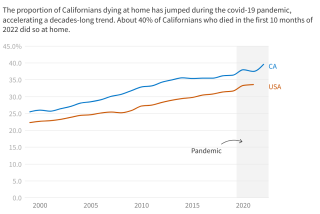Not Something for Do-it-Yourselfers
- Share via
Patient, heal thyself! That should be the new motto for HMOs.
To cut costs, HMOs are shifting the burden of caring for the sick from their staff and provider networks to patients themselves and their often ill-prepared family members. They do this by reducing the length of time patients are permitted to stay in hospitals and forcing them to undergo many complex medical treatments in clinics, out-patient surgery centers or at home.
Advocates of “managed care” say these policies actually protect patients from being exposed to hard-to-treat hospital-borne infections and other problems associated with hospital care. But early discharge policies and expanded outpatient treatment leaves many patients at great risk in other ways. The question that health maintenance organizations and their would-be regulators fail to address is: Who’s going to take care of the sick at home? The mounting costs--emotional, physical and financial--that families or patients have to bear are never part of the industry’s cost-benefit analyses.
Although patients’ protests have led the media and some politicians to criticize the practice of sending new mothers home after 24-hour hospital stays, the trend toward shortened hospital stays and more outpatient procedures involves far more than labor and delivery.
Patients who used to be in the hospital for a week after a hip replacement now stay only three days; patients who had coronary artery bypass graft surgery are pushed out after four or five days. Doctors are routinely performing operations in out-patient surgery centers, clinics or their own offices, which were once done in the hospital. Mastectomies, knee surgery, even some parts of bone marrow transplants and other aggressive, highly toxic cancer chemotherapies are done in outpatient settings.
This results in some patients being sent home in highly unstable condition, with orders to take up to a dozen or more medications--all of which have potential interactions and side effects that should be carefully monitored. Family members are expected to manipulate intravenous pumps to deliver these medications to the patient, feeding tubes to nourish them and even ventilators to help them breath.
In the brave new world of managed care, medical equipment companies drop off a ventilator or IV infusion pump, give a family member a hasty lesson in their use and then move on to the next client. There is no follow-up to make sure that an anxious mother, husband or daughter has figured out what it takes nurses--the skilled professionals who use this equipment and monitor treatments in clinics and hospitals--weeks, if not months, to learn. Patients who don’t have family members to perform these tasks are forced to “nurse” themselves.
It’s not surprising, therefore, that U.S. patient deaths due to medication errors in the outpatient setting increased more than eightfold between 1983 and 1993, according to the British medical journal, the Lancet. The Lancet reports that at least some of these deaths may have been attributable to the fact that patients and families, rather than medical personnel, are now responsible for outpatient treatment “quality control.”
These tragedies could be averted if patients and family members were assisted by home health nurses. But just when they need more of that help, they’re getting less. HMOs provide fewer home care services--sometimes almost half as many visits--as traditional indemnity plans. And Congress has cut Medicare home care services by 30% across the board. As a result, visiting nurse agencies are cutting staff, some are closing and others are avoiding the sickest patients whose full costs will not be reimbursed.
Clearly, most people--whether patients or their families--can’t handle this burden of the care alone. If Congress really wants to be helpful, it must immediately restore its own cuts in Medicare home care services and require HMOs to pay for more of these services for patients under 65. Legislators must also address the more fundamental problem that profit-driven managed care has powerful incentives to keep its costs down by offloading as many as possible on us. Legislation must allow patients and their physicians to decide where treatments are performed and where patients can recover, without managed care guidelines that endanger lives.
More to Read
Sign up for Essential California
The most important California stories and recommendations in your inbox every morning.
You may occasionally receive promotional content from the Los Angeles Times.













